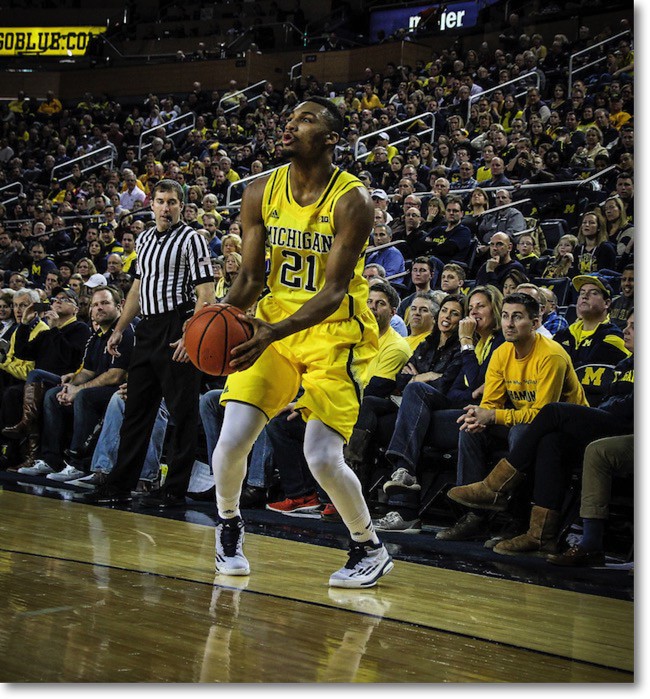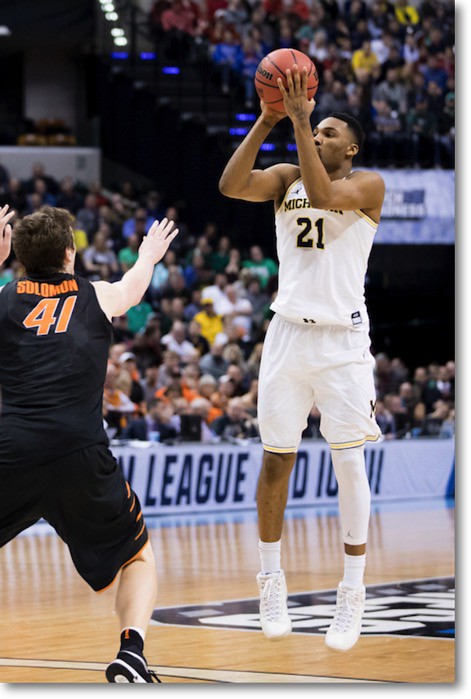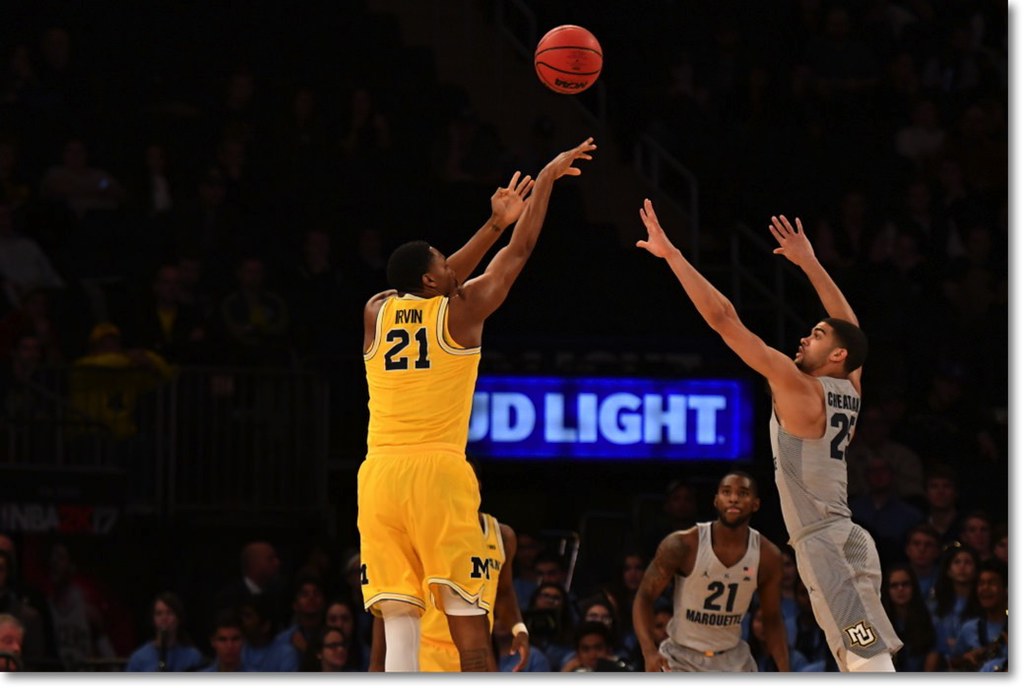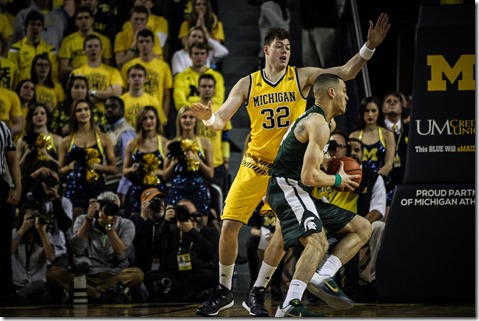zak irvin is happening



Unorthodox. [Eric Upchurch, Marc-Gregor Campredon, Joseph Dressler]
Zak Irvin made six hundred field goals at Michigan. Each one seemed like a minor miracle.
I say this out of admiration. Pick up a basketball, head to the park, and try to replicate Irvin's shot. To do this, stand pigeon-toed while holding the basketball low and in front of you like a hot casserole just out of the oven; with your hands on the sides of the ball, swing it above your head on a path that passes by your left front pocket; as the ball rises in front of your face, rotate your hands so your shooting hand is under the ball; lock your elbows at a 90-degree angle; flick your wrist to release at the apex of your jump; hold your follow-through at a 45-degree angle. It'll look something like this:
You won't make it. Certainly not the first time, and probably not on the hundredth, either.
Perhaps it shouldn't have been a surprise that Irvin's career was for a long time defined by its inconsistency.
After Irvin's freshman year, it was difficult to keep expectations in check. On a 2013-14 team loaded with NBA talent, he excelled in the role of unabashed gunner off the bench. He hoisted 146 three-pointers and made 43% of them, seamlessly replacing Nik Stauskas, who'd become the team's star, as the instant offense freshman who promised a whole lot more in the future.
Irvin's game, however, was extremely limited. He recorded all of 13 assists in 37 games. His defensive rebound rate was lower than Spike Albrecht's. Nearly 75% of his shots came from beyond the arc; according to hoop-math, all ten of his makes at the rim were assisted.
[Hit THE JUMP.]
3/23/2017 – Michigan 68, Oregon 69 – 26-12, season over
[Joseph Dressler]
There are few things more haunting in sports than coming up on the short end of a bonafide one-point basketball game. There are so many points and so many opportunities to get two more or prevent two more that it is impossible not to inventory all the slight tweaks in the universe that could have gotten you one step closer to the promised land, or at least destruction at the hands of Kansas.
The wide open DJ Wilson layup and two Duncan Robinson threes that were halfway down stand out in this regard. So too does the late Oregon free throw miss that Wilson couldn't box out on. And then there is the blizzard of threes that did not go halfway down, for reasons.
Oregon's approach seemed to be "leave Michigan blitheringly wide open from three and see what happens." Michigan took more threes than twos, and if any of them seemed unreasonable it was only in aggregate. There will be some complaints about Michigan launching early in the shot clock, but the vast majority of Michigan's 31 attempts from behind the arc were preceded by my inner monologue—and sometimes the external one, too—yelling "shoot that." A couple of ugly ones should have been rhythm catch and shoot opportunities that Muhammad-Ali Abdur-Rahkman and Mo Wagner, collectively 0-8 in this game, passed up on to dribble themselves into worse shots.
This is certainly a way to play against a John Beilein team. Usually it's a way to get your face melted off. The shattered corpse of Oklahoma State basketball would like a word at this point. That word is "aaaargh."
-------------------
And yet.
Michigan hit a respectable 11 of 31—36 percent. This was not enough. It was not enough even though they won the style contest on defense. Oregon only got up 10 transition shots, which they did poorly on. A third of their shots were the two point jumpers Michigan strives to force and Oregon is very bad at. They hit 25%.
If you'd told me all the peripheral numbers from this game beforehand I'd have taken it in a hot second. I would not have believed you if you'd told me that despite those numbers Michigan's offense would look like a hamster searching for a wheel for big chunks of the game.
Dana Altman's combination of the half-ass press a bunch of teams run now that the shot clock is down to 30 and 40% matchup zone got Michigan off balance. A plan to punish the incessant switching by replicating the second half against Louisville ended up with some poor Wagner shots and turnovers; Wagner spent the last ten minutes on the bench in favor of Duncan Robinson, who seemingly couldn't guard anyone on the floor.
The game was just... off. With virtually every ticket in the sweaty palms of Kansas fans the arena was near-empty at tipoff and dead throughout. That gave a tense, taught game an unfortunate NBA D-League or NCAA hockey regional vibe, and while I don't think that caused the ugly game it certainly reinforced it. It was weirdly muted for one of the most important games of the college basketball season.
It was ugly to the point where a final score close to 70 for both teams is unexpected. Michigan perpetually felt eight points behind and suddenly they were in the lead with two minutes left, sort of like the Oklahoma State and Louisville games. And then.
In the aftermath you're left grasping at opportunities spurned, at whatever air eddies pushed this ball a micron away from a good-enough trajectory, at this breakdown or that breakdown that would go almost entirely unremarked upon if not for the fact that Oregon had N and Michigan had N –1.
An inch; a point; it's been a year of almosts for Michigan athletics.
Bullets
Rather satisfying all the same. Losing a one-point Sweet Sixteen game is no shame. It's a hard thing to do, winning basketball games against good teams. Michigan picked up a banner, got a measure of Louisville revenge, and was amongst the best teams in the country for a full half season. Over the full span they finished 20th on Kenpom.
This wasn't a return to the Burke/Stauskas years but it was a solid top 25 season.
The Walton; the Irvin. I pulled the "Zak Irvin is happening" tag out of mothballs for this game because he was happening, man. His late surge as he re-found his excellent-third-banana level was such that everybody had to stop complaining about him. This is a monumental internet accomplishment. He held Michigan in this game, hit tough late-clock shots, and was clearly on another level from Duncan Robinson as he checked Oregon's perimeter guys.
Building on that? Obviously much hinges on the return of Wilson and Wagner. I'd guess with their tough final games and the super deep draft—DX has Caleb Swanigan 30th!—both will return for another year of that sweet Beilein development. Both guys are potential lottery picks if they continue to improve at a decent clip. Right now there are sufficient questions that they'd be borderline first rounders.
If Michigan does not have any unexpected departures you're looking at something like:
- Xavier Simpson/Eli Brooks
- MAAR/Jordan Poole
- Charles Matthews/Duncan Robinson
- DJ Wilson/Isaiah Livers
- Mo Wagner/Jon Teske/Austin Davis
Michigan does have an open scholarship they could use on either Mo Bamba—uh not likely—or one of the late risers they've done so well with; there are also a number of intriguing transfer options. Since Brooks and Poole may not be impact freshmen, an immediately eligible backcourt scorer would be real nice. You've probably heard about faintly ludicrous Chippewa Marcus Keene and his 37% usage. Keene shot 82/51/37 on incredible volume and had an excellent assist rate on a bad MAC team that was nonetheless 56th in offensive efficiency.
There's also New Mexico guard Elijah Brown, another 30%+ usage player with decent efficiency. His three point shooting fell off this year but he was near 40% a year ago (on 226 attempts); he gets to the line and his excellent FT shooting implies that his rough two point percentages are more about his situation than his talent.
Or Michigan could go the Matthews route again and attempt to acquire the services of blue-blood transfer Chase Jeter, who's leaving Duke after two injury-plagued years. Jeter is a 6'10" post and would have to sit out, so he's not an ideal fit for the roster. I'd still poke around there because the rate of big washout is so high. You can't count on both Teske and Davis being around in two years. See: all of college basketball.
Tourney coverage complaint. There are way too many fouls that don't get replays to check on them. DJ Wilson's second was a potentially dubious call on which a second look would have been very helpful; instead nothing.
Also in complaints: I have no idea how anyone can listen to Reggie Miller and think "I should pay this person to do this thing."
[Upchurch]
As time winds down on the regular season, Michigan finds itself squarely on the bubble – the classic meh major-conference team that gets sent to Dayton as an 11-seed. Big Ten play is almost over and we know the Wolverines were a middle-of-the-road team (as of right now: 7th in Sagarin’s and Pomeroy’s ratings, 7th in conference efficiency margin, and are likely to tie Ohio State as the 7th place team in the league). When your best resume asset is that you haven’t lost to any bad teams, it hasn’t been a great season. The very real possibility that Michigan misses the NCAA Tournament would qualify this year as a big disappointment.
Still, even though Caris LeVert and Spike Albrecht have combined to play just 48 minutes against Big Ten opponents, Michigan will finish with a winning record in Big Ten play and (probably) a positive efficiency margin in league play. This season’s path was very comparable to last season’s: the teams had uninspiring non-conference performances and Caris was lost near the beginning of league play (and Spike and Derrick Walton were injured this year and last, respectively). A year ago, the Wolverines finished 8-10 in Big Ten play – losing four overtime games and winning one – and this year, 10-8 or 11-7 will be the final result. Since Michigan didn’t drop a stinker like NJIT or Eastern Michigan like last season, we’re going to be nervously watching on Selection Sunday – can 3 good wins and a bunch of chalk get us in?
The reason why Michigan hasn’t been better is fairly obvious.
I don't expect Michigan to be actually good at defense for a lot of different reasons, but there's a difference between Michigan's usual meh and this. The trend is worrying. Defensive efficiency in the Beilein era:
- 2008: 100th
- 2009: 69th
- 2010: 58th
- 2011: 37th
- 2012: 61st
- 2013: 48th
- 2014: 109th
- 2015: 107th
- 2016: 145th
This is the third straight year of a triple-digit ranking. While you may remember things as "not good" even when the larger picture was much prettier, this is a whole new era of ineptness only matched by Beilein's first team of castoffs and runaways. This year's team is in fact considerably worse despite than those guys despite having a reasonable amount of experience. For the first time in a while Michigan doesn't have a freshman playing major minutes; for the first time in a while they've crawled out of the 300s in Kenpom's experience stat. This was the first year in a while you could reasonably expect year to year improvement, and yet.
Big Ten 2-pt defense:
— Alex Cook (@_ac616) February 29, 2016
1. MSU (41.4%)
...
13. Rutgers (52.4%)
14. Michigan (55.3%)
WORSE THAN RUTGERS
When you’re worse than Rutgers at something as critical as 2-point FG % defense, you have a major problem.
[After the JUMP, a lot of graphs]


37